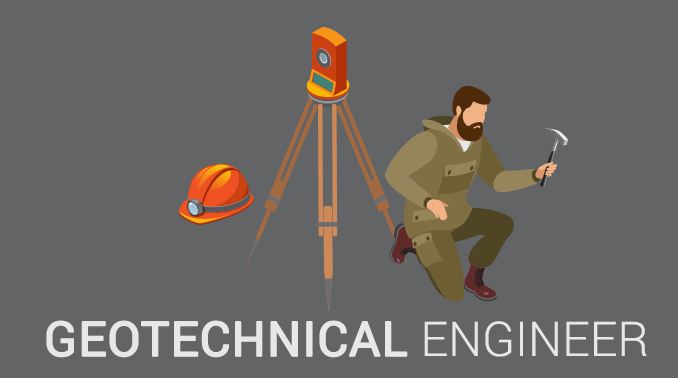See This Report about Geotheta
See This Report about Geotheta
Blog Article
Geotheta Fundamentals Explained
Table of ContentsA Biased View of GeothetaThe Best Strategy To Use For GeothetaExamine This Report on GeothetaThe Buzz on GeothetaThe 25-Second Trick For Geotheta

They carry out website examinations, collect samples, do research laboratory examinations, and analyze data to examine the viability of the ground for building and construction tasks - Engineer of Record. Based on their searchings for, geotechnical designers give recommendations for foundation design, slope stability, maintaining structures, and reduction of geotechnical dangers. They team up with various other specialists, such as architects, architectural designers, and building and construction groups, to make certain that geotechnical factors to consider are integrated right into the overall job design and application
By examining the habits and buildings of dirt and rock, they can recognize potential geotechnical hazards such as landslides, dirt negotiation, or incline instability. Their experience aids protect against failings or mishaps that might jeopardize lives and residential property. Right here are some comprehensive responsibilities and responsibilities of a geotechnical designer: Website Investigation: Geotechnical engineers conduct website examinations to gather data on subsurface problems.
They translate the information to comprehend the properties and actions of the dirt and rock, including their strength, leaks in the structure, compaction features, and groundwater problems. Geotechnical Analysis and Design: Geotechnical engineers evaluate the data collected throughout website examinations to analyze the security and viability of the site for building jobs. They carry out geotechnical calculations and modeling to evaluate aspects such as birthing ability, negotiation, slope stability, side planet pressures, and groundwater flow.
The Buzz on Geotheta
Foundation Design: Geotechnical designers play an important role in designing structures that can securely support the desired framework. They assess the dirt conditions and lots requirements to establish the proper foundation type, such as superficial foundations (e.g., footings), deep structures (e.g (https://www.evernote.com/shard/s342/sh/0ddde0a2-417b-669e-3d11-8f53bf2073ba/dxCfPcosgpFcDl9WAXonEVeNbxWt1i_y0aMcgTcK_KXcXyxfIS3apQYAgA)., piles), or specialized methods like soil enhancement. They consider elements such as settlement restrictions, birthing ability, and soil-structure communication to develop optimum structure designs
They assess building strategies, screen website tasks, and perform field inspections to validate that the style referrals are adhered to. If unforeseen geotechnical problems arise, they analyze the scenario and offer recommendations for remediation or changes to the style. Risk Evaluation and Reduction: Geotechnical engineers analyze geotechnical hazards and threats related to the job website, such as landslides, liquefaction, or dirt erosion.

Partnership and Communication: Geotechnical engineers function very closely with other experts entailed in a project, such as architects, architectural designers, and construction groups. Reliable communication and cooperation are essential to incorporate geotechnical considerations into the general project layout and construction process. Geotechnical engineers give technological know-how, answer queries, and make certain that geotechnical demands are fulfilled.
The smart Trick of Geotheta That Nobody is Discussing
Right here are some kinds of geotechnical designers: Foundation Engineer: Structure engineers specialize in creating and examining foundations for structures. They analyze the soil conditions, tons requirements, and site qualities to identify the most appropriate structure kind and style, such as superficial structures, deep structures, or specialized strategies like pile structures.
They evaluate the aspects influencing incline security, such as dirt buildings, groundwater conditions, and incline geometry, and establish techniques to stop incline failures and reduce dangers. Earthquake Designer: Quake engineers focus on examining and making structures to hold up against seismic forces. They examine the seismic hazard of a website, evaluate dirt liquefaction possibility, and establish seismic style standards to make sure the security and resilience of frameworks during quakes.
They perform field testing, collect examples, and evaluate the gathered information to identify the soil residential or commercial properties, geologic formations, and groundwater conditions at a site. Geotechnical Instrumentation Engineer: Geotechnical instrumentation engineers concentrate on tracking and measuring the actions of soil, rock, and frameworks. They install and maintain instrumentation systems that keep track of factors such as soil negotiation, groundwater levels, slope activities, and structural variations to assess performance and give very early warnings of prospective issues.
About Geotheta
They perform tests such as triaxial examinations, combination examinations, direct shear tests, and permeability examinations to collect information for geotechnical analysis and style. Geosynthetics Engineer: Geosynthetics designers specialize in the visit here layout and application of geosynthetic products, such as geotextiles, geogrids, and geomembranes. They make use of these materials to enhance dirt stability, reinforce inclines, provide drain remedies, and control erosion.
They have a tendency to be investigatory people, which implies they're intellectual, introspective, and investigative. They are curious, systematic, rational, analytical, and rational. Some of them are additionally social, suggesting they're kind, generous, cooperative, individual, caring, valuable, understanding, sensible, and pleasant. Does this audio like you? Take our free job examination to learn if geotechnical designer is one of your top profession suits.
In the office setting, geotechnical designers make use of specialized software devices to perform estimations, produce styles, and assess information. They prepare records, testimonial project specs, communicate with customers and employee, and coordinate job activities. The office setup offers a conducive environment for research, evaluation, and partnership with other professionals associated with the job.
Things about Geotheta
They regularly see project websites to conduct website investigations, assess geotechnical problems, and gather information for analysis. These visits include taking a trip to different areas, in some cases in remote or tough terrains. Geotechnical designers may execute soil sampling, conduct tests, and screen building and construction activities to make certain that the geotechnical aspects of the job are being implemented properly.
Geotechnical designers additionally work in specialized geotechnical laboratories. Geotechnical lab engineers work thoroughly in these atmospheres, managing screening tools, running tools, and videotaping information.
Report this page